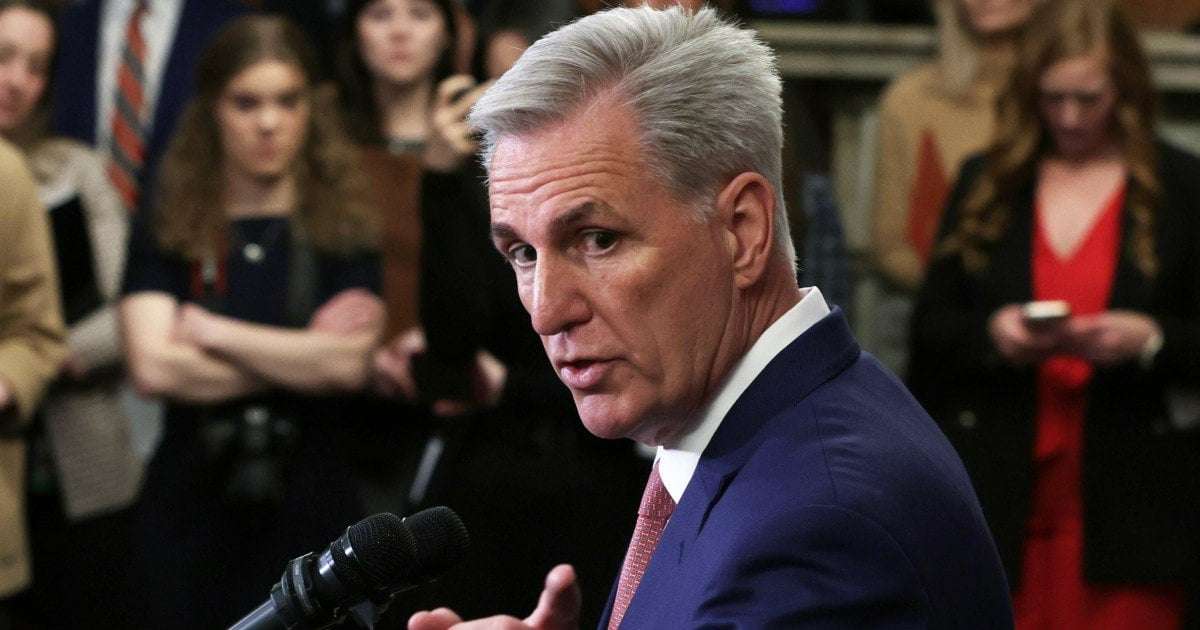The clown car that has been Rep. Kevin McCarthy’s speakership spluttered to a halting start over 15 long ballots in January and hasn’t had a second of a smooth ride since. From botched committee hearings to failed subcommittees to intra-leadership disputes, the House speaker’s tenure has been a kaleidoscope of incompetence. But McCarthy’s latest stumble is the most important, as it concerns the entire U.S. economy.
Last week, McCarthy finally introduced his debt ceiling bill, which would raise the limit by $1.5 trillion until March 31, 2024 — that is, not even for one year. In return, McCarthy and his supporters want to cut nondefense spending to fiscal year 2022 levels across-the-board (thereby allowing Republicans to claim ignorance of specific reductions). The few details we do have are headache-inducing: a rollback of increased IRS funding (which raises the deficit), a cancellation of President Biden’s student debt forgiveness program and an imposition of work requirements for Medicaid and other aid programs — which are neither effective nor necessary. (Prime-age employment is at its highest level in more than 20 years.)
To procrastinate while faced with such a crisis is malpractice.
The problem here isn’t the bill itself — even though it has the absence of substance you’d expect from today’s GOP. The problem is that the basic elements of what’s being requested in the bill have been public knowledge for months, and yet McCarthy and his team have dawdled on bringing it to the floor. And even after all this time, McCarthy is, once again, struggling to find the 218 votes he needs to pass the proposal. “The whip count on this is not good,” one senior Republican told Axios on Thursday.
There is no excuse for such negligence. A recent report from Moody’s Analytics projects that a prolonged default would cause an economic downturn “comparable to that suffered during the global financial crisis,” costing more than 7 million jobs and destroying more than $10 trillion in household wealth. To procrastinate while faced with such a crisis is malpractice.
Worse, time is shorter than many realize. The day before McCarthy introduced his bill, Goldman Sachs economists echoed earlier warnings from Treasury Secretary Janet Yellen that default could occur as soon as the first half of June, due to “weak tax collections.” (And under McCarthy’s proposal, in less than a year, the country gets to do this all over again.)
Admittedly, McCarthy’s deficiencies didn’t have to be this consequential. Last fall, I argued that Democrats erred in not raising the debt limit while they still held both houses of Congress. But moderates thought there was plenty of time to work out a bipartisan deal, and the White House and congressional leadership was in no hurry to push them.
Months later, the only existing bipartisan alternative is a farce, a warmed-over one-page proposal from the Problem Solvers Caucus calling for a “fiscal commission.” If that sounds vaguely familiar, you might be thinking of the “supercommittee,” the 2011 special congressional committee to lower the national debt. Or you might be thinking of the 2010 Bowles-Simpson commission on deficit reduction. Both panels, as it happens, ended in failure — part of a larger series of debt ceiling and budget fights that lowered the U.S. government’s credit rating and raised its borrowing costs.
Now one of the bit players in those fights is House speaker. McCarthy’s failures in that office have been, like the rest of his career, largely inconsequential. But if the country is to raise the debt limit in an orderly fashion, then he must quickly find one of two qualities he’s never displayed before. Either he’ll need to put his country over his position and broker a bipartisan deal in the House before the Freedom Caucus inevitably replaces him. Or he’ll need to persuade a dozen or more Republicans, whose brand is just this side of “death to Democrats,” to hold hands with Biden.
The odds of the latter are slim to nonexistent; the odds of the former are simply nonexistent.
The safest road ahead for Democrats, then, is to lay the groundwork now for making McCarthy inconsequential in this crisis, too. Even assuming the president and the speaker do end up negotiating, there’s no reason to believe McCarthy can be trusted to negotiate in good faith when a few votes here or there could change his mind overnight. Nor is there any reason to believe, if he promises to deliver 218 votes, that he can do so in fewer than than 15 ballots.
Off-ramps remain, including invoking the 14th Amendment, minting a platinum coin, forcing a discharge petition through the House and issuing “premium bonds.” But these alternatives are untested. Whatever the chosen solution, Democrats can't wait until the eve of default to prepare the public (especially in the case of the discharge petition, which needs at least 30 legislative days to proceed). They should emphasize that they have every intention of honoring our debts with any measures necessary. And they should remind voters that with a responsible, effective Republican leader, these measures wouldn’t be necessary.
But we don’t have leadership. We don’t have selflessness. We don’t have competence. We have Kevin McCarthy.

JohnnyGFX on April 24th, 2023 at 13:40 UTC »
The plan was always to get into the debt ceiling crisis. They want to tank the economy, but want to blame Biden for what they do. They create the problem, then they blame Democrats for the problem, then they claim they are the only ones who can fix the problem they created. It’s been their ONLY playbook for years.
Crazy-Nights on April 24th, 2023 at 13:16 UTC »
Weird how their ban on books, drag queens, budweiser, and transgender care didn't create sudden economic boom 🙄
prohb on April 24th, 2023 at 12:59 UTC »
Republicans can't govern. They can only destroy.